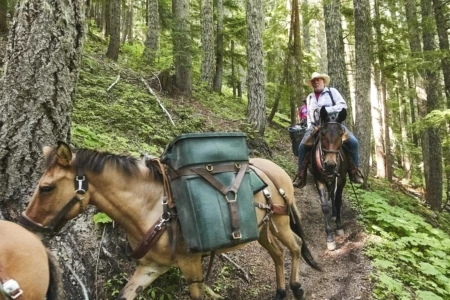It Takes All Kinds: Horses and Bikes in the Washington Backcountry
The Trans-Cascadia has become one of the Pacific Northwest’s most notorious races. This past August, the Back Country Horsemen of Washington joined the Trans-Cascadia team—a first for all involved.
Over the past five years, the Trans-Cascadia has become one of the Pacific Northwest’s most notorious events: a four-day, blind-format, backcountry enduro race, where riders barrel down a course they’ve never ridden, as fast as possible, on some of the region’s most challenging terrain.
Trans-Cascadia’s larger mission, however, extends beyond those four fast-paced days. The nonprofit has created a successful model of how to both set up a race and support sustainable trails in the Pacific Northwest, giving back to the local communities on which the event depends. Over the past five years, they’ve logged thousands of volunteer-hours and reclaimed hundreds of miles of trail in both Oregon and Washington. The work parties follow a well-rehearsed pattern: long, hard days, followed by time with friends around the campfire, gourmet meals in the middle of nowhere and the opportunity to ride the newly opened trails before the weekend is out. In 2019 alone, their work parties put in more than 3,000 hours of volunteer trail work, revitalizing over 100 miles of trail in Washington’s Gifford Pinchot National Forest.
But this August’s work party, held in that same forest, was a little different.
When the volunteers piled out of the pickup trucks at base camp, exhausted and damp after a long, all-weather day working on the trails, dinner was already being prepared. Cold beer (and Mountain Dew) sat readily available in an array of open coolers, and someone had lit a fire to toast away the evening chill. But this year’s volunteers weren’t just two-legged; many of the pickups were also pulling horse trailers.
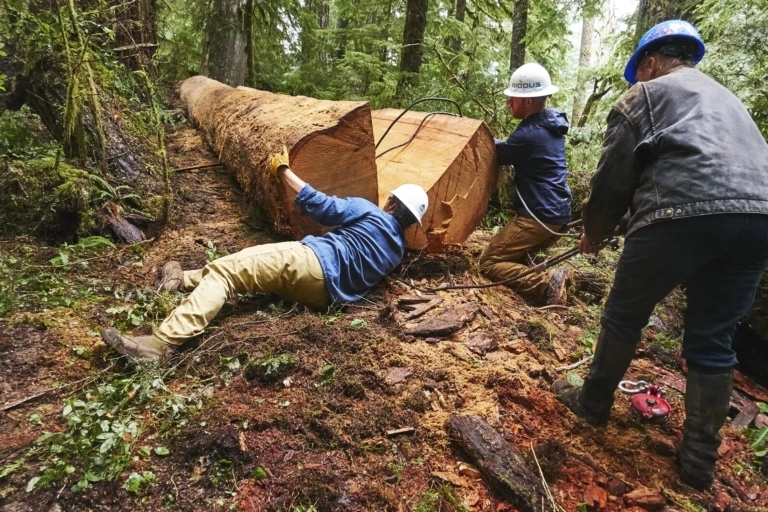
Trans-Cascadia cofounders Tommy Magrath and Nick Gibson work with a member of the Back Country Horsemen of Washington in Washington State’s Gifford Pinchot National Forest, splitting a fallen Douglas fir to replace a damaged bridge over a boggy trail area. Photo: Chris Hornbecker
For 2019, Trans-Cascadia and the Cowlitz-Naches Chapter of the Evergreen Mountain Bike Alliance partnered with the Back Country Horsemen of Washington (BCHW), a first for all involved. It was a good thing, too. Of the many projects on the go for the weekend, one task was especially daunting. At some point over the past four years, a large tree had fallen on an existing bridge spanning a boggy section of trail. The resulting debris had caused a creek to back up, creating even more damage.
Harnessing the knowledge and experience of the professional riggers and loggers in the BCHW and the sheer enthusiasm of the mountain bikers, the team spent the weekend cutting long bridge supports (called “stringers”) off a fallen Douglas fir. Then, working shoulder-to-shoulder in often-wet conditions, they placed two 24-foot logs—each weighing in at about 12,000 pounds—across the creek.
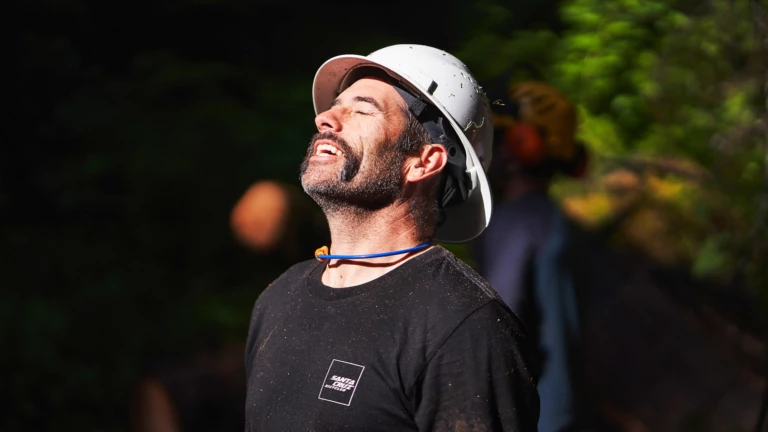
Henry Horrocks has a spiritual moment after a long, hard day of trail building. Photo: Chris Hornbecker
Although the whole process seemed familiar, it likely wouldn’t have happened even a few years ago. This time, despite the long history of conflict between mountain bikers and horseback riders, all it took was a phone call.
After hosting their first three races in Oregon in different backcountry areas, Trans-Cascadia moved the event to Gifford Pinchot National Forest for their fourth year. The logging and brushing they’d done to sustain the local trails caught the attention of the BCHW, whose members hadn’t been able to access their Green River Horse Camp—and therefore the adjoining trails—for years due to road closures. When the horseback riders returned to the area after the 2018 race, they were grateful for the work the Trans-Cascadia teams had done, and they wanted to help. That’s when they picked up the phone.
But as Doc Wesselius, a retired veterinarian who joined the BCHW in 1995, would tell you, it wouldn’t have always been so smooth. In many regions of the country, there are long-standing territorial disputes between horseback riders and mountain bikers. Some are caused by cultural conflicts, but there is a practicality to the situation: Combining bikes and horses on trails without education and etiquette can be extremely dangerous for everyone involved. Still, both groups are out there for similar reasons; they share a passion for the solitude and quiet of Mother Nature. And, like most friction between seemingly different groups, a lot of problems can be solved at the individual level.
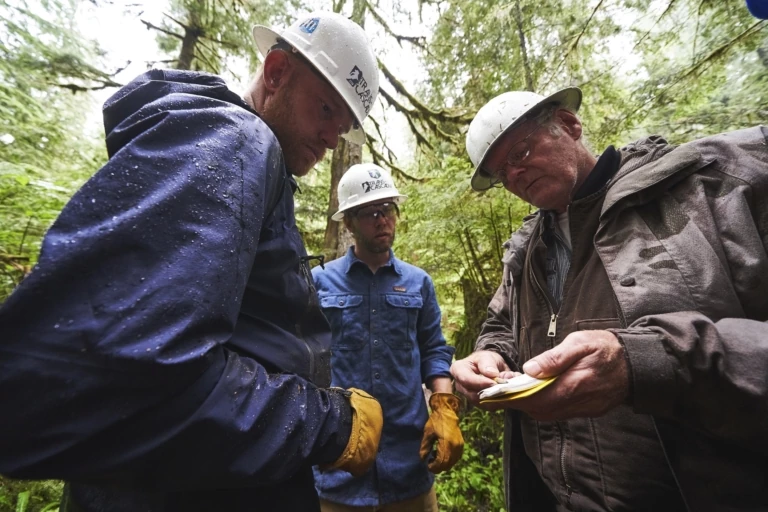
Trans-Cascadia’s August work party represented a milestone of cooperation between horse folk and mountain bikers—and from the amount of work accomplished, it won’t be the last. Tommy Magrath and Nick Gibson do some trailside brainstorming with a member of the Back Country Horsemen of Washington. Photo: Chris Hornbecker
“You start liking the people who are enjoying the same thing that you like,” Doc says. “We all hate our neighbors until we get to know them, and I think once we get together and I see mountain bikers stopped in the middle of the trail taking a picture of Mount Rainier [I realize] we have something in common. I enjoy that view, too. We start finding out that we have more in common than we have petty territorial disputes. You have to have respect for the other user groups. That’s all there is.”
Each evening, the camp buzzed as the crew told tales of what they had learned, contributed and achieved working alongside an entirely new group of folks. They passed photos around the fire of the impressive woodwork and the celebratory beer and whiskey—brought in by the horse packers—the group had shared over a job well done. The lasting impact of their experience was so positive, it was hard to remember that the experimental partnership had been 30 years in the making.
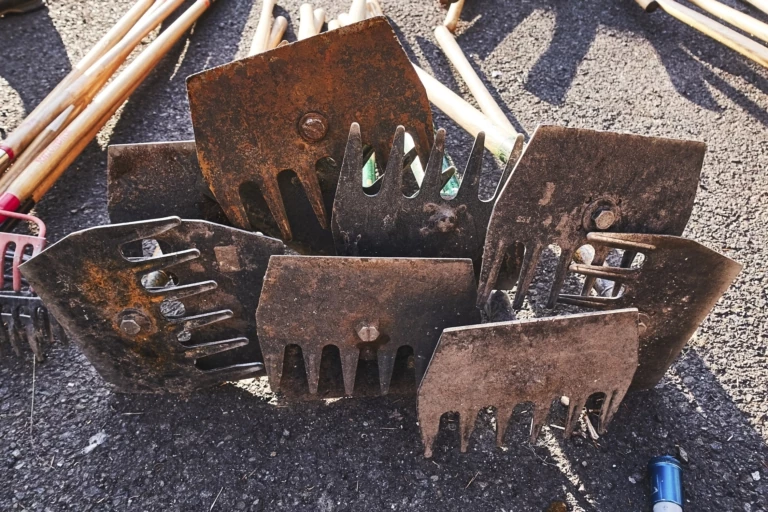
Tools of the trade. One of Trans-Cascadia’s advocacy focuses is building tool libraries for the communities and local trail organizations they work with. Photo: Chris Hornbecker
“I think that what’s important is what we can do for each other instead of harping on some of the little problems that we have,” Doc says. “We just have to be cognizant of what other people want and what other people desire and then be respectful of that.”
Over the weekend, Doc noted, everyone remained focused on one thing: maintaining access to the backcountry. In his opinion, with the federal government’s budget cuts and the aging demographics of the Back Country Horsemen, working together is mandatory to keep the trails open, whether for cyclists, horse packers or hikers.
“Our particular organization is getting older and older every year and we’re not able to get it all done anymore,” Doc says. “We can provide the expertise; we’ve got people who are bridge-builders and that type of thing, who can get those things done. But we need to get other people involved if we’re going to save these [trails] for the next generation and the generation after that. We are going to have to work together. Otherwise, your kids and grandkids will probably be showing up to a ‘Trail Closed’ sign.”
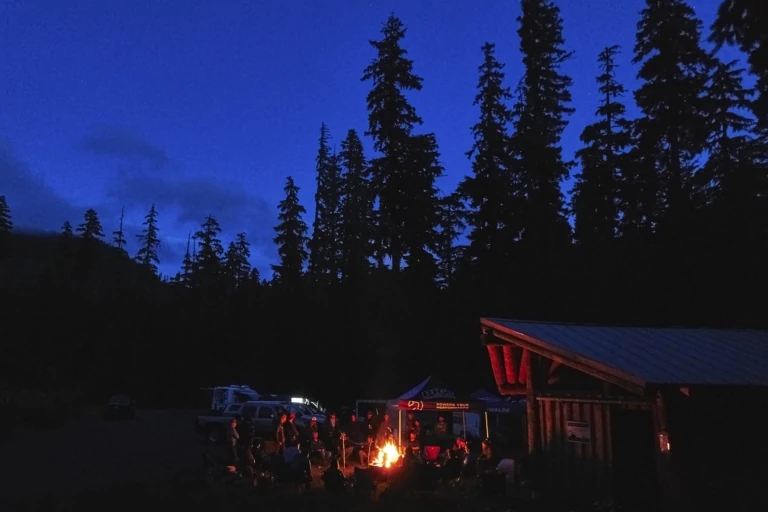
Now that deserves a cold beverage. The Trans-Cascadia trail work crew gathers around the campfire to swap stories and share a round of celebratory beers. Photo: Chris Hornbecker
At the end of the weekend, the Back Country Horsemen and Trans-Cascadia enjoyed a feast, cheered the success of their efforts, and celebrated their new collaboration. Somewhere between the slow-roasted pig and the award-winning Dutch oven apple turnovers, it became undeniable that despite the difference in interests, ages and experiences, the two groups had created something special. And that—like Mother Nature—beer, whiskey and Mountain Dew know no barriers.
“[This] is something that I’ve advocated for years and it all came together this week,” says Doc, grinning. “It was a tremendous experience. A tremendous experience.”
